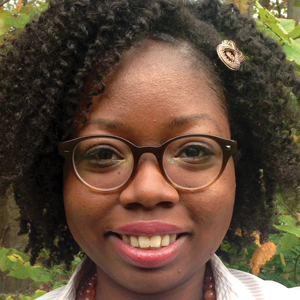‘We're all a bunch of weirdos doing our stuff’
Charles Sanders talked to ASBMB Today about his experience working on biopharmaceutical products at XBiotech, where he started as a research associate in March, and Grifols, where he worked for more than three years after earning his bachelor’s in biochemistry. This interview has been condensed and edited.

Current position: Research associate II at XBiotech
Career path: Bachelor’s in biochemistry, Texas State University
First job outside of academia: Testing technologist at Grifols
Favorite molecule or protein: "I actually do have a favorite one because I love its name. It's polytetrafluoroethylene. I just like the way it rolls off."
What made you decide to focus on products?
Both Grifols and XBiotech manufacture medicine, and I enjoy pharmaceuticals. I just really enjoy helping people. I’ve been wanting to make medicines for a long time. I feel like it’s a good contribution to the world. Before I was part of it, but now I’m really part of it because I’m in the research department at XBiotech. I actually get to start everything and test things out.
Grifols is one of the largest producers of plasma medicines in the world. Tell me about your work there as a testing technologist.
It was an entry-level position. There are people who have been there for forever. Also, there are people coming later in life. But generally they like to hire people straight out of college.
We would take the plasma that got sent to us. We would screen it using different biochemical assays, like the ELISA. We had something called the C8000 that would test for total protein concentration and concentration of alanine aminotransferase as a test for donor liver health. We also tested for syphilis and rabies — all kinds of fun stuff.
You have a new role at XBiotech as a research associate. Tell me about that.
I’m still in the training phase. I have to find out where everything is and exactly what’s going on, but I've become pretty independent. I’ve been doing mostly gel runs and western blots. Basically, doing protein analysis, checking for different proteins, and seeing if antibodies will bind to them because we’re looking for specific things.
There’s different departments: There’s cell lines — they do all the cloning. There’s biochemistry, there’s animal models — all kinds of teams — but I’m specifically in the in vitro testing.
I feel at home. We’re all a bunch of weirdos doing our stuff.
How did you wind up at XBiotech?
I think the three years of experience I got at Grifols really helped me, and I think that’s what got me drafted to this position. I did undergrad research, and the scientist who leads my team recognized my principal investigator’s name. And then he saw what I’d been doing at Grifols.
He said that, because of COVID-19, most people were doing their master’s degrees online, but they don’t have any actual research experience. So I outranked a lot of master’s students because I have real-world experience. So, I think it was all worth it.
What advice do you have for students who are interested in industry?
Do it if you want to experience the world. I think you should explore the world and learn how the Food and Drug Administration works and good manufacturing practices.
If you want to stay in academia, you can do that. But I actually think academia is more stressful. I felt like, if I just stayed in academia, I’d be losing potential to learn the world.
Enjoy reading ASBMB Today?
Become a member to receive the print edition four times a year and the digital edition monthly.
Learn moreFeatured jobs
from the ASBMB career center
Get the latest from ASBMB Today
Enter your email address, and we’ll send you a weekly email with recent articles, interviews and more.
Latest in Careers
Careers highlights or most popular articles

Close out ASBMB 2026 with a bang
The closing reception of the 2026 ASBMB Annual Meeting will be held at the Torpedo Factory Art Center in Alexandra, Virginia.

Redefining lipid biology from droplets to ferroptosis
James Olzmann will receive the ASBMB Avanti Award in Lipids at the ASBMB Annual Meeting, March 7–10, just outside of Washington, D.C.

Creating change in biochemistry education
Pamela Mertz will receive the ASBMB William C. Rose Award for Exemplary Contributions to Education at the ASBMB Annual Meeting, March 7-10 in Washington, D.C.

Trainee mentorship as immortality
Suzanne Barbour will receive the ASBMB Sustained Leadership Award at the ASBMB Annual Meeting, March 7-10 in Washington, D.C.

Upcoming opportunities
Join us Feb. 5! The monthly ASBMB Transcription Webinars aim to facilitate knowledge exchange and collaboration among researchers in the fields of transcription, chromatin and epigenetics.

Life in four dimensions: When biology outpaces the brain
Nobel laureate Eric Betzig will discuss his research on information transfer in biology from proteins to organisms at the 2026 ASBMB Annual Meeting.

